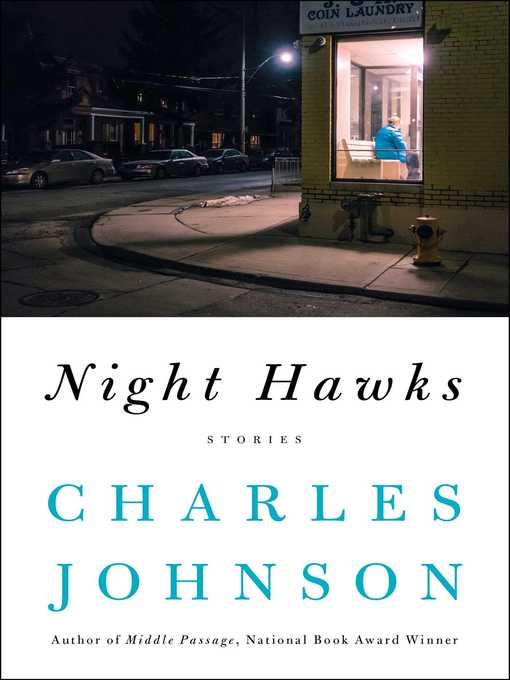
Night Hawks
Stories
- اطلاعات
- نقد و بررسی
- دیدگاه کاربران
نقد و بررسی

March 1, 2018
In "The Cynic," an early story in this arresting collection from National Book Award winner Johnson (Middle Passage), a disgruntled Plato, unable to communicate his vision of abstraction to mocking students, notices the full moon and is "ambushed by its sensuous, singular, and savage beauty." Readers encounter that beauty throughout as Johnson finds his clear way to experience, showing his characters stepping back to understand the world, then rushing to embrace it. A Japanese priest presiding over his own private sanctuary, who learns from a visiting African American scholar that he's been "locked in a cycle of emotion (his own)" and decides to reach out and create a congregation, an escaped slave returning to rescue others acknowledging that "he had known happiness and freedom" as he runs madly, leading a soulcatcher away from his quarry--these are the indelible moments that show Johnson to be a master of the short form. VERDICT Highly recommended.
Copyright 2018 Library Journal, LLC Used with permission.

March 15, 2018
A modern master's latest array of glittering tales offers the pleasures and solace of storytelling.This is Johnson's (The Way of the Writer, 2016, etc.) fourth collection, and as before, his stories can be as morally instructive as fables, as fancifully ingenious as Twilight Zone scripts, and as elegantly inscrutable as Zen riddles. In stories such as "The Weave," in which a stylist seeks revenge by stealing valuable hair extensions from her former employer, and "Occupying Arthur Whitfield," in which a cab driver intends to commit larceny upon a seemingly truculent passenger, Johnson imparts wisdom with cunningly selective detail in both character and milieu; he can evoke the lingering residue of chemicals in the vacant beauty shop with just a few lines. Johnson is in immaculate control of the stories' myriad settings, as in the ancient Greece of "The Cynic," where Plato is dislodged from his smug certainties by Diogenes' bug-eyed eccentricities. Johnson's philosophical and spiritual erudition, most prominently displayed in such novels as Oxherding Tale (1982) and Dreamer (1998), also insinuates itself in to "Prince of the Ascetics," in which a Buddhist monk discovers a "middle way," and "Idols of the Cave," in which a Muslim-American soldier's conflict with a bigoted white officer while stationed in Afghanistan climaxes in the ruins of an ancient library. Johnson's whimsical side comes through in "Guinea Pig," which extracts deeper tones and craftier implications from the hoary old science-fiction subgenre of "personality transfer." The title story is in many ways the book's most distinctive: It takes the form of a late-night conversation between the author and his late friend and Pulitzer Prize-winning playwright August Wilson in the coffee shops and bars of Johnson's Seattle hometown. Even here, there's an unexpected twist, but, as with the other tales, what's even more unexpected is how this startling development emerges with such unassuming control. It's gratifying to put yourself in the hands of a veteran storyteller who knows what he's doing--and is quietly secure in what he's teaching.
COPYRIGHT(2018) Kirkus Reviews, ALL RIGHTS RESERVED.

June 18, 2018
These striking stories from National Book Award–winner Johnson (Middle Passage) span a wide range of time periods and cultures but are woven together with a subtle thread of compassion. In “The Weave,” Ieesha and Tyrone pull a heist at a salon, stealing bags of human hair, artfully shedding light on the pain of feeling one’s hair is “never beautiful as it is” when one is not part of the dominant culture. Back in the time of Plato, the philosopher himself clashes with the cynics, who push him to question his very core, in “The Cynics.” In “Occupying Arthur Whitford,” a poor young black cab driver in Seattle attempts to rob a rich older white customer who was rude to him, but is shaken by what he finds in the man’s house. Elsewhere in Seattle, a University of Washington student makes money by participating in dubious medical studies and experiences a “body swap” with a Rottweiler in “Guinea Pig.” In the dystopian future of “4189,” death is forbidden, and a sex doll in disguise as a real woman leads a man toward a joint suicide. These inventive stories feature characters that experience darkness and display the complexity of the human soul, resulting in a provocative and sensitive collection.




دیدگاه کاربران